#dungeonmaster tips
Text

You never know!
slyflourish.com
pointsofinspiration.com
#dnd#dnd5e#dungeonmaster#dungeons and dragons#dm tips#dm advice#dm inspiration#fantasy#ttrpg#rpg#pathfinder#sly flourish#points of inspiration
1 note
·
View note
Text
Friday night DM advice
Give your NPC's cool magic items - especially the NPC's your PC's are going to fight... because then your PC's get the cool magic items.
1 note
·
View note
Text
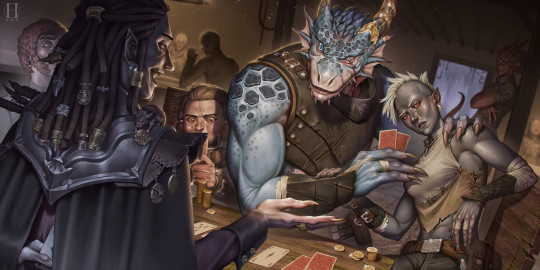
Dm Tip: Playing the Villain/ Guidelines for "Evil" Campaigns
I've never liked the idea of running an evil game, despite how often I've had people in my inbox asking how I'd go about it. I'm all about that zero-to-hero heroic fantasy not only because I'm a goodie twoshoes IRL but because the narrative-gameplay premise that d&d is built around falls apart if the party is a bunch of killhappy murder hobos. Not only would I get bored narrating such a game and indulging the sort of players who demands the freedom to kill and torture at will (I've had those before and they don't get invited back to my table), but the whole conceit of a party falls through when the obviously villainous player characters face their first real decision point and attempt to kill eachother because cooperation is a thing that goodguys do.
Then I realized I was going about it all wrong.
The problem was I had started out playing d&d with assholes, those "murder and torture" clowns who wanted to play grand-theft-auto in the worlds I'd created and ignore the story in favour of seeing how much unchallenged chaos they could create. They set my expectations for what an evil campaign was, and I spent the rest of my time developing as a dungeonmaster thinking " I Don't want any part of that"
But what would an evil campaign look like for my playgroup of emotionally healthy friends who understand character nuance? What would I need to change about the fundamental conceit of d&d adventures to refocus the game on the badguys while still following a similar enough narrative-gameplay premise to a hero game? How do we make that sort of game relatable? What sort of power/play fantasy can we indulge in without going off the deepend?
TLDR: In an evil campaign your players aren't playing the villains, they're the MINIONS, they're mooks, henchmen, goons, lackeys. They're the disposable underlings of uncaring overseers who have nothing but ill intent towards them and the world at large.
Where as in a hero game the party is given the freedom to challenge and overthrow corrupt systems, in an evil game the party is suck as part of that corrupt system, forced to bend and compromise and sacrifice in order to survive. The fantasy is one of escaping that corrupt system, of biding your time just long enough to find an opening, find the right leverage, then tossing a molitov behind you on the way out.
Fundamentally it's the fantasy of escaping a shitty job by bringing the whole company down and punching your asshole boss in the face for good measure.
Below the cut I'm going to get into more nuance about how to build these kinds of narratives, also feel free to check out my evil party tag for campaigns and adventures that fit with the theme.
Designing a campaign made to be played from the perspective of the badguys requires you to take a different angle on quest and narrative design. It’s not so simple as swapping out the traditionally good team for the traditionally bad team and vis versa, having your party cut through a dungeon filled with against angel worshiping holyfolk in place of demon worshipping cultists etc.
Instead, the primary villain of the first arc of the campaign should be your party’s boss. Not their direct overseer mind you, more CEO compared to the middle managers your party will be dealing with for the first leg of their journey. We should know a bit about that boss villain’s goals and a few hints at their motivation, enough for the party to understand that their actions are directly contributing to that inevitable doom.
“Gee, everyone knows lord Heldred swore revenge after being banished from the king’s council for dabbling in dark magic. I don’t know WHY he has us searching for these buried ancient tablets, but I bet it’s not good”
Next, you need a manager, someone who’s a part of the evil organization that the party directly interfaces with. The manager should have something over the party, whether it be threats of force, blackmail, economic dependency… anything that keeps the antiheroes on the manager’s leash. Whether you make your manager an obvious asshole or manipulative charmer, its important to maintain this power imbalance: The party arn’t going to be rewarded when the boss-villain’s plan goes off, the manager is, but the manager’s usefulness to the boss-villain is contingent on the work they’re getting the party to do. This tension puts us on a collison course to our first big narrative beat: do the party get tired of the manager’s abuse and run away? Do they kill the manager and get the attention of the upper ranks of the villainous organization? Do they work really hard at their jobs despite the obvious warning signs and outlive their usefulness? Do they upstage their manager and end up getting promoted, becoming rivals for the boss-villain’s favor?
Building this tension up and then seeing how it breaks makes for a great first arc, as it lets your party determine among themselves when enough is enough, and set their goals for what bettering the situation looks like.
As for designing those adventures, you’ll doubtlessly realize that since the party arn’t playing heroes you’ll need to change how the setup, conflict, and payoff work. They’re still protagonists, we want them to succeed after all, but we want to hammer home that they’re doing bad things without expecting them to jump directly to warcrimes.
Up to no good: The basic building block of any evil campaign, our party need to do something skullduggerous without alerting the authorities. This of course is going to be easier said than done, especially when the task spins out of control or proves far more daunting than first expected. The best the party can hope for is to make a distraction and then escape in the chaos, but it will very likely end with them being pursued in some manner (bounties, hunters, vengeful npcs and the like). Use this setup early in a campaign so you have an external force gunning for your party during the remainder of their adventures.
Dog eat dog: It’s sort of cheating to excuse your party’s villainous actions by having them go up against another villain who happens to be worse than they are. The trick is that we’re not going after this secondary group of outlaws because they’re bad, we’re doing it because they’ve either got something the boss wants, or they’re edging in on the boss’s turf. This sort of plotline sees the party disrupting or taking advantage of a rival’s operation, then taking over that operation and risking becoming just as villainous as that rival happened to be. This can also be combined with an “Up to no good” plot where both groups of miscreants need to step carefully without alerting an outside threat.
The lesser evil: This kind of plot sees your party sent out to deal with an antagonistic force that’s a threat not only to the boss’s plans but to everyone in general. In doing so they might end up fighting alongside some heroes, or accidentally doing good in the long run. This not only gives your party a taste of heroism, but gives them something in their back pocket that could be used to challenge the boss-villain in the future.
The double cross: In order to get what they want, the party need to “play along” with a traditional heroic narrative long enough to get their goal and then ditch. You have them play along specifically so they can get a taste of what life would be like if they weren't bastards, as well as to make friends with the NPCs inevitably going to betray. This is to make it hurt when you have the manager yank the leash and force the party to decide between finishing the job , or risk striking out on their own and playing hero in the short term while having just made a long term enemy. This is sort of plot is best used an adventure or two into the campaign, as the party will have already committed some villainous deeds that one good act can’t blot out.
Next, lets talk about the sort of scenarios you should be looking to avoid when writing an evil campaign:
Around the time I started playing d&d there was this trend of obtusely binary morality systems in videogames which claimed to offer choice but really only existed to let the player chose between the power fantasy of being traditionally virtuous or the power fantasy of being an edgy rebel. Early examples included:
Do you want to steal food from disaster victims? in Infamous
Do you as a space cop assault a reporter who’s being kind of annoying to you? in Mass Effect
Do you blow up an entire town of innocent people for the lols? in Fallout (no seriously check out hbomberguy’s teardowm on fallout 3’s morality system and how critics at the time ate it up)
I think these games, along with the generational backwash of 90s “edge” and 00s “grit” coloured a lot of people's expectations ( including mine) about what a "villain as protagonist" sort of narrative might look like. They're childish exaggerations, devoid of substance, made even worse by how blithely their narratives treat them.
Burn down an inn full of people is not a good quest objective for an evil party, because it forces the characters to reach cartoonish levels of villainy which dissociates them from their players. Force all the villagers into the inn so we can lock them inside and do our job uninterrupted lets the party be bad, but in a way that the players can see the reason behind it and stay synced up with their characters. The latter option also provides a great setup for when the party's actually monstrous overseer sets the inn on fire to get rid of any witnesses after the job is done. Now the party (and their players) are faced with a moral quandary, will they let themselves be accessories to a massacre or risk incurring their manager's wrath? Rather than jumping face first into cackling cruelty, these sorts of quandaries have them dance along the knife's edge between grim practicality and dangerous uncertainly; It brings the player and character closer together.
Finally, lets talk about ending the villain arc:
I don't think you can play a whole evil campaign. Both because the escalation required is narratively unsustainable, but also because the most interesting aspect of playing badguys is the breaking point. Just like heroes inevitably having doubts about whether or not they're doing the right thing, there's only so long that a group of antiheroes can go along KNOWING they're doing the wrong thing before they put their feet down and say "I'm out". I think you plan a evil campaign up until a specific "there's no coming back from this" storybeat, IE letting the Inn burn... whether or not the party allows it to happen, it's the lowest point the narrative will allow them to reach before they either fight back or allow themselves to be subsumed. If they rebel, you play out the rest of the arc dismantling the machine they helped to build, taking joy in its righteous destruction. If they keep going along, show them what they get for being cogs: inevitably betrayed, sacrificed, or used as canon fodder when the real heroes step in to do their jobs for them.
Art
#dm tip#dm tips#writing advice#evil party#drafting the adventure#dnd#d&d#dungeons and dragons#blades in the dark#ttprg#pathfinder
407 notes
·
View notes
Photo
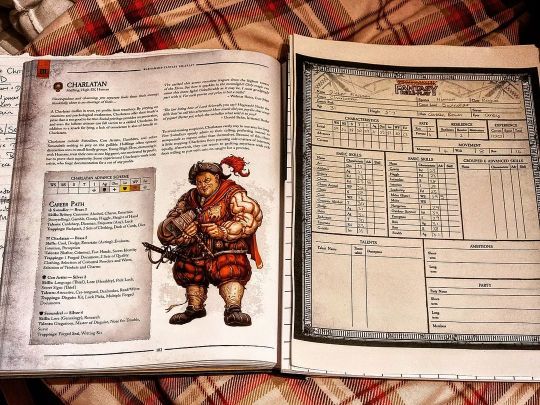
So, filling out my first Warhammer Fantasy Roleplay Game character to help understand the game. (Randomly Generated) i've only ever run dnd games so it's a bit of a culture shock, but I'm liking the look of the system! (My group I want to run it for as well are massive warhammer fans, so the enthusiasm is NICE) Any other GMs from this system who know a good channel for tips and tools for running games with this system? #nerds #geeks #gamers #warhammer #warhammerageofsigmar #warhammerfantasy #warhammerfantasyroleplay #whfrpg #tabletopgaming #gaming #dnd #dungeonsanddragons #ttrpg #rpg #dungeonmaster https://www.instagram.com/p/Clb8GebsTeo/?igshid=NGJjMDIxMWI=
#nerds#geeks#gamers#warhammer#warhammerageofsigmar#warhammerfantasy#warhammerfantasyroleplay#whfrpg#tabletopgaming#gaming#dnd#dungeonsanddragons#ttrpg#rpg#dungeonmaster
2 notes
·
View notes
Text
14 tips for a first time Dungeon Master [Reaction]
#TTRPG Opinions and Commentary:
🎲 In this video we react to an article titled 14 Tips for a First Time Dungeon Master, and offer agreement or better suggestions.
#DnD #DnD5e #DungeonMaster #GameMaster #TTRPGFamily
In this video we react to an article titled 14 Tips for a First Time Dungeon Master. The article covers such topics as how to prepare for a session, how much agency to give the players, and how to gain confidence. We don’t always agree with what the article proposes, so check it out and give us your thoughts.
📢 Let us know what you think about the video below, or if you believe we made any…
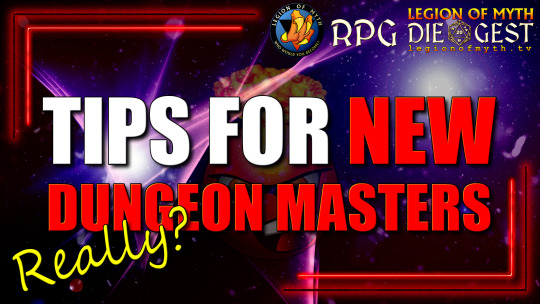
View On WordPress
#bad dungeon master#bad dungeon master advice#bad game master#d&d 5th edition#d&d advice#d&d tips#dm advice#dm mistakes#dm tips#dm tips and tricks 5e#dm tips dnd#dnd dm mistakes#dnd dm tips#dnd stories#dungeon master#dungeon master advice#dungeon master mistakes#dungeon master tips#dungeons & dragons#Dungeons and Dragons#game master#game master tips#gm tips#how to play d&d#mistakes new dungeon masters make#tabletop RPG
3 notes
·
View notes
Link
Tips for running D&D for teens from Dungeon Craft. A video from a few months ago that I must have missed.
1 note
·
View note
Photo
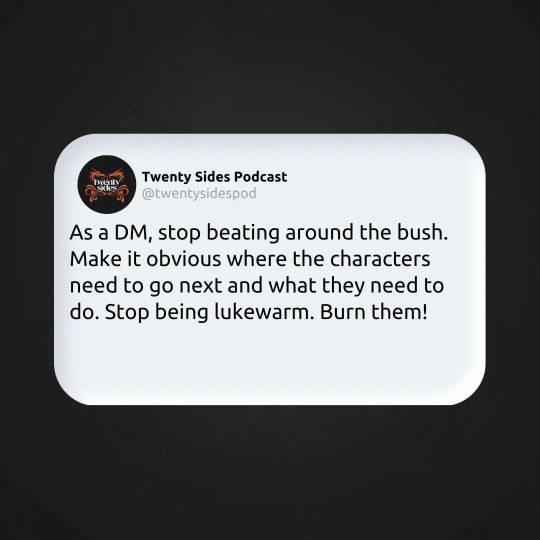
This is a great #DM tip. If it's clear to you, it's murky to your players. You've you to be painfully obvious with them! Oh, and go follow our podcast @twentysidespod on Instagram! . . . . . #dnd #dungeonsanddragons #rpg #ttrpg #fantasy #tabletopgames #dungeonmaster #criticalrole #dndcharacter #tabletop #dndart #tabletoprpg #pathfinder #digitalart #dnddice #dndmemes #dungeonsanddragonsart #tabletopgaming #warhammer #roleplay #miniatures #cosplay #onednd #opendnd (at Nashville, Tennessee) https://www.instagram.com/p/CnQD-SPPdVP/?igshid=NGJjMDIxMWI=
#dm#dnd#dungeonsanddragons#rpg#ttrpg#fantasy#tabletopgames#dungeonmaster#criticalrole#dndcharacter#tabletop#dndart#tabletoprpg#pathfinder#digitalart#dnddice#dndmemes#dungeonsanddragonsart#tabletopgaming#warhammer#roleplay#miniatures#cosplay#onednd#opendnd
1 note
·
View note
Text
Choosing a campaign for new players.
Later today I will be meeting with some new players and I want to try something new. I want to go into it with no particular adventure in mind. Since they are new players I want to try and figure out what they want to play before making a selection. I have plenty of past campaigns I wouldn't mind returning too as well as access to some published adventures. Writing something new isn't out of the question either.
What sorts of questions would you ask new players with no experience in order to gauge what style of campaign to run? So far I plan to ask what aspect of D&D is appealing to them and describe some of the adventures I already have.
#dungeons and dragons#dungeonmasterdude#dungeonmaster tips#dungeon master tips#dungeonmaster#dungeon master#d&d#dnd#dm help#design#adventure#ask a dm#role play#role playing#role playing games#rpg#wotc#dm tips#d&d tips#roleplaying#gm#d&d help
39 notes
·
View notes
Text
a little neat trick to improve drow as a whole
Okay, consider this: you can put drow in your setting minus all the weird bd*sm flavored society, the weird fetish stuff, the obsession with sex and the skimply clothing. Or, uh, the whole nonsensical murder and hating everything and everyone 24/7 and the whole “no, drow can’t love things, they just do not understand what it is, it’s not in their nature” (which was canon in 3.5e, btw)
Even better, try to regard them as an intelligent race that isn’t inherently inclined to evil just because they’re drow! No one is born evil! Cultures exist, and no race has “absolute irredeemable bastard” written in their genetics! No one considers humans evil as a whole just because some fucked up societies existed!
I can assure you, it’s okay! It’ll improve them. It works. No one will get in your home to scream about how it’s wrong! I’ve been doing it for 6 fucking years now and it’s nice!
#drow#dark elf#elf#dnd#dungeons and dragons#dnd5e#dnd 5e#dnd 3.5#elves#homebrew#dungeon master#dungeonmaster#pathfinder#ttrpg#tabletop rpg#dark elves#dnd tips#dndmeme#dnd meme#dnd memes
331 notes
·
View notes
Text
5 Dungeon Master Tips to Running a Great Session
Players are gathered around the table. There is a hum in the air of activity as they laugh and joke about the latest nerd news, recommendations for activities to do together, and plain mischief. As you raise your hands, a silence washes over. They know their favorite day of the week has come at last, and you begin again.
Now, doesn’t that sound awesome? In reality, people will look at their phones, wander their eyes, not pay attention, and forget what happened last session, but as the Dungeon Master, it is your duty to keep the DND session fun and interesting for your gang of miscreants. Creating the story is just the tip of the iceberg. Through managing player conflict, in game world building, crafting interesting NPC’s, and a variety of voices, the Dungeon Master has a lot to do, and it’s not an easy game to run. As a new DM at my first table, let me share with you 5 tips that I’ve learned from other games, experience players/DM’s, and my chaotic evil players.
1. Prepare Little
While this may seem counterintuitive, let me explain. When I first started DMing, I played straight out of the books. This is an excellent way to start because everything is prepared for you to run! All you must do is guide the party through, but when I started to strike out on my own, I found the task of creating a session overwhelming. I had to cancel two or three sessions this way. I would get so anxious sitting at my desk coming up with ideas that I’d shut down. This last session, I decided to pick one thing I wanted the party to do and figure it out from there.
2. Have a Couple Tables Handy
This is where the tables come in! I have a couple books that I greatly enjoy to make NPC’s, little one shot snippets, taverns, alleyways, forest encounters, etc. Having a few tables ready and in your possession will help relieve the pressure of what comes next since it’s up to chance anyway. As always though, you’re the Dungeon Master, and
3. Reward the Party
Although I leave some space to breathe going through a session, when the battle is over, the party gets rewarded. All good stories have something to get you interested, a little lore, a fight, and some reward at the end. Getting that gold at the end of the fight is important because heroes (or villians) need a little something to keep them going. If your session ends without deepening their pockets or knowledge of a bigger plan, they may become bored.
4. Tap into Their Backstory
Speaking of boredom though, who can be bored of themselves? This ties in to point three a bit, but everyone wants to shine at some point in the game. When you hear of player exploits, they talk about themselves and what they did to contribute to the party. It’s not out of self-centeredness or selfishness, that’s just how humans work, so tapping into their backstory for some plot points is an excellent way for them to feel important and get them involved in the game. Who can sit on their phone when the action is all about them? Just make sure everyone has a turn in the spotlight.
5. Relax
Finally, if you learn nothing else, relax. This is a game, and games are meant to be fun. If you’re not having fun and your players are not having fun, what’s the point? Afterall, it is a game, and while the game can have emotional draw, highs and lows, bittersweet endings, and stage right plot twists, everyone at the table should be having a good time. If they did, congratulations! You’re the best Dungeon Master out there.
Whew! Well, I hope some of what I said helped. There are more points we can get into, but these are some of my personal highlights from my own games. I’ve struggled as a Dungeon Master and really only had one successful session thus far, but hey, everyone has to start somewhere. It can be intimidating as well if experienced players are in your group, but let yourself breathe. You’re going to do great.
Until next time!
#dnd#dungeonsanddragons#rpg#ttrpg#d#fantasy#tabletopgames#criticalrole#dice#dungeonmaster#dndcharacter#tabletop#tabletoprpg#pathfinder#miniatures#roleplay#dnddice#tabletopgaming#warhammer#tips#motivation#selfhelp#love#youcandothis#relax#improve#npc#tipsandtricks#chaotic#chaos
7 notes
·
View notes
Text
The Dungeon Master’s Handbook: 5 Non-Prep Tips to Improve Your Game
Are you a Dungeon Master looking to up your game? Check out our latest article for easy-to-implement tips that will help you perform at your best. #DungeonMaster #dnd5e #TabletopGames
As a dungeon or game master how you prepare for a session can be very important. Taking care of yourself outside of game time can improve your performance as a DM. Here are five tips that can help you improve your game without requiring you to spend more time preparing for the session.
Get A Good Nights Sleep
There are many benefits to having a consistent sleep schedule and consistent sleep…
View On WordPress
#dnd#dnd5e#dungeon master#dungeon master tips#dungeon masters handbook#dungeons & dragons#dungeons and dragons#game#game master#game master tips#mental health#pathfinder#rpg#tabletop games#tabletop gaming#ttrpg
2 notes
·
View notes
Text

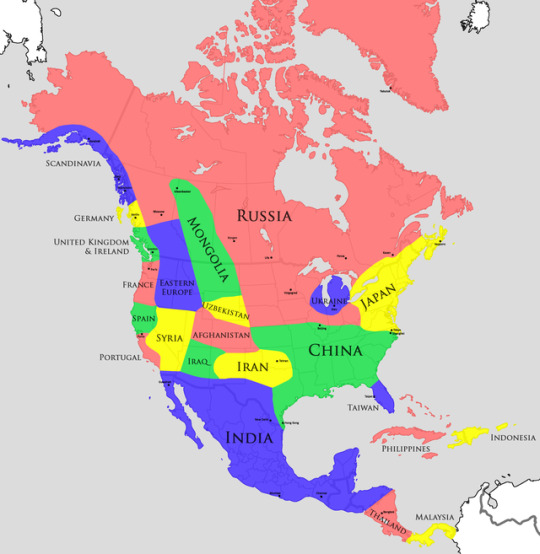
Based solely on how much these images have helped me as a DM, I felt sharing them with you is only right.
60 notes
·
View notes
Text
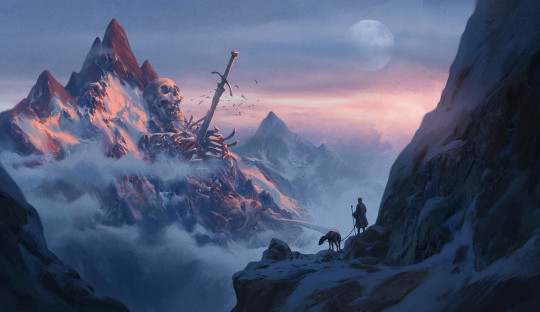
DM Tip: Creating a Campaign Skeleton
Learning to be a better dungeonmaster was a protracted process. A younger me was often so stressed out by the desire to be a better artist that I'd have legitimately mauled a person if it would've revealed to me the wisdom I sought (with my hands or even an actual maul given the chance).
One of my biggest hurdles was the idea of a universal framework for d&d adventures, a guideline that would tell me if the things I was creating were on the right track. It was sorely needed, I loved the process of being creative but without an understanding of how my creative energy was best used I ended up sinking days, weeks, or even months worth of energy into projects that went nowhere. Worse yet, when I DID get a chance to put my ideas into practice at the table they'd frequently spiral out of control and crash, resulting in even more stress.
Over time I learned from these mistakes, I got better, and then I got good. I moved from conscious incompetence to competence, and I ended up having a run of absolutely stellar campaigns that were everything my younger self could have dreamed of: stable, enjoyable, meaningful, and most importantly an absolute delight to my players. Routinely I'd have people, including folks that'd only played with me a few times, mention that getting together to roll dice and listen to me babel on in silly voices was a highlight of their week.
It was as one of these campaigns began to wind down (three years! a satisfying conclusion on the horizon!) and I started looking for a followup scenario that I decided to study all my really successful campaigns and figure out what connected them. The end result was something I'd been looking for for nearly a decade, a reliable format that I could build campaigns around.
I want to preface this section with the understanding that while this information is laid out in a vaguely chronological fashion there's no guarantee that these ideas will occur to you in any particular order. Inspiration is a funny thing, and each idea flows into the others to make a cohesive whole. Due to foreshadowing and setup reasons you're also going to need a pretty solid idea about all of these when starting a campaign, though exact details will likely change/ can be vague up until the moment they're needed.
The Reason: Who are we and what are we doing?
Gives your players a solid background to build their characters around and give them a reason to travel together, rather than having to ad lib one on the spot.
Likewise sets expectations of what the campaign is "about" that you can build on or subvert in time.
The reason doesn't need to hold true for the entire game, just long enough to serve as a framing device. EG: The Witcher starts out as a "monster of the week" setup and then uses that framework to pivot into politics and prophecy once we've seen the premise play out.
The Pilot/Crashtest Adventure: What's first?
I’ve already written about these, but the general concept is to give your party a mostly contained first outing that doesn’t have any larger bearing on the plot so they can focus on learning how their characters play/building the party dynamic.
By the time the party's finished this first adventure they'll have already started putting down roots in the world: they'll have in jokes, npcs they've started to care about, an understanding of what's on the horizon, and an idea of where they want to go next.
The Central Gameplay Pillar: How does this all work?
It's important to have an idea what your campaign is going to be about in a mechanical sense in addition to its plot and themes. There is a difference between an adventure that has the party delve a dungeon, and a dungeoncrawling focused campaign.
I like to lead with these outright during the campaign pitch so that players can know what they're getting into. Your playgroup will likely have strong opinions about what they like and dislike, even if they don't have the words to describe it, so you might need to explain the ideas for them.
The Hub: Where are we?
I think every good campaign has a hub, some kind of settlement that the party returns to between adventures to offload loot, pick up supplies, and sift through the latest gossip to look for the next questhook. Letting the party return to the same place lets them build up a relationship with it, clarifying the picture in their mind as new details are added and they grow more and more attached. It's possible to have multiple hubs over the course of a campaign, but I'd advise really only having one per arc to best concentrate your efforts.
Fill up your hub with distractions and side adventures, shorter stories that the party can get tangled up in while the larger adventure slowly reveals itself.
Returning to the same hub also means returning to a familiar and expanding cast of NPCs, which helps your party become more and more invested in the setting
The Main Event: What's going to happen?
Here we get to the meat of the issue, the big story you want to be telling using this campaign. To pull off the sick narrative kickflip you wish to perform, you're going to need to lay a lot of groundwork, seeding in details left and right as well as giving the party a chance to stumble across evidence of your schemes without ever realizing the whole thing.
To do this, you're going to work in the building blocks of your big reveal/twist/pending disaster into the setting along with those side adventures from the hub. This will give your party an idea that something is going on, but with more pressing matters to take care of they're going to be distracted up until the moment you decide to pull the trigger.
The Setting: What's over there?
While things like genre and tone are definitely things you should have a handle on from the outset, I personally feel like the details of a setting are best constructed on an ad hoc basis, either in a direct response to something required by part of the narrative (be it side story or main event), or pencilled in at the margins as the party explores the world..
That said, creation of the hub and setting often go hand in hand because it's important to match the settlement to the environment and then shape the environment to the quests inside the settlement.
As for what's beyond your hub, I happen to have just written something about building out settings.
Now, this next option is one that I recommend you start thinking about only once your campaign is fully underway, so it doesn't clog up your creative process by focusing on something that you might not even get to
The Change: What the fuck?
A little while after the main event has kicked off and your party is off on the quest that will turn them from mere adventurers into heroes, they start to hear rumours of strange happenings. It's certainly not related to the present scenario, it may even be an unexpected windfall, but it's not something they have time to look into.
Time ticks on, the land is saved, and the party is able to enjoy their victory lap as well as some dearly needed time off. Before they can get comfortable however they're slammed by some strange occurrence that they could have never predicted that changes the state of the world. A neighbouring kingdom invades, an important ally is murdered and they're blamed for it, a dragon starts rampaging through the realm.
Its important that this event is outside the party's skillset, not necessarily diametrically opposed, but counter to what they were planning
artsource
322 notes
·
View notes
Text
Pro tips for writing a sad boi character
Give your sad boi a more dramatic personality. Also give him personal dilemma that’s an extreme that has extended from his trauma. This gives depth and a real reason for being a sad boi. This is opposed to the *it happened and now my life sucks* mold which can come off as bland and just there for surface level pity. Sad bois exist to make the reader cry. If you’re not crying, it’s not sad or believable enough.
Example
Sad boi trauma is that his only living parent was killed in a car accident.
Extreme Result of trauma: sad boi never obtains his license. He refuses to get in a car and will walk or ride his bike anywhere instead.
Dramatic personality quirks: avoids drinking, is hyper aware, often paranoid
Good luck with your sad boi! <3
#writers#roleplay#writerslife#fantasy#adventure#writeblr#dungeonmaster#writer#dnd#dungeons and dragons#sadboiz#sad boi aesthetic#sad boi shit#sad boi club#writing productivity#writing tips#active rpg#rpg#fantasy rp#original character#demisexual#demigirl#furry community#lgbt girl#novelist#novel writing#fictional characters#character concept#my characters#writing tropes
18 notes
·
View notes
Text
DM tip
something we did off the cuff in one of our campaigns a while back and has now become standard practice, is to take a strip of paper, write a player character’s name on it (or “DM” or “monster 1” etc) and fold it over our DM screen, and then moving them into the initiative order during combat, which makes it easy for everyone to know the order and their place in it.
In my own campaign I’ve made rough little sketches of the player characters, and occasionally I also sketch some new ones of whatever monster or npc they’ll face in that session
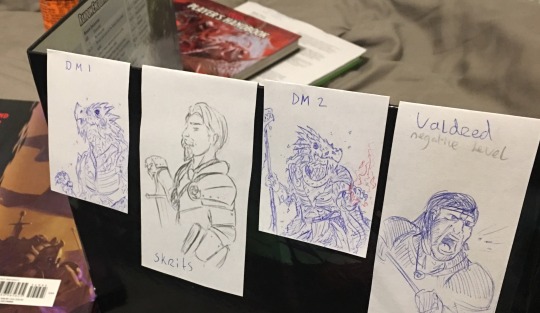
One handy thing about this is that on the back of them I can write down key rules, such as their attacks, saving throws and spells so that I can see them at a glance, and as you can also see in the first picture I wrote in pencil that Valdred has one ‘negative level’, so that the player doesn’t forget that he has a penalty on some of his rolls.
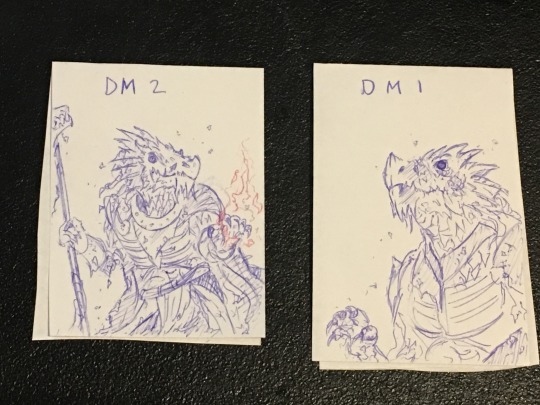

2K notes
·
View notes
Text
10 quick adventure ideas #3
Someone has stolen farmer Martin's prize pig, and the tracks lead into the woods
A ghost has been haunting the local tavern for the past few weeks, and it's bad for business.
A giant has laid claim to the town, saying it is within his domain, and requires everyone to swear loyalty.
The nearby lake has had reports of strange monsters lurking in the shore at night, scaring away the local fisherman.
A man calling himself the King of Bees has been attacking citizens with his swarms of insects. (Bonus points if he steals honey)
Deep in the snowy mountains, a ruined city has just been discovered and is rumored to be ripe with treasure.
The town's folk are holding a lunar festival, but during the ceremony the moon vanishes.
A knight in black armor blocks a small bridge nearby, and refuses to let anyone pass.
Everyone in a small village have started turning into anthropomorphic animals, usually in their sleep.
A wizard has accidentally turned himself invisible indefinitely, and needs specific ingredients to reverse the effects.
#d&d ideas#d&d#dm tips#dungeon master#dungeons and dragons 5e#dungeons and dragons#dungeonmaster#dungeons and dungeons#dungeon master tips#adventure ideas#dm tools
119 notes
·
View notes